Better curb management with smartphone data

To improve mobility and traffic safety in downtown areas, some cities are testing technology that uses smartphone apps to give parking departments much-needed data.
To improve mobility and traffic safety in downtown areas, some cities are testing technology that streamlines curb management by giving parking departments much-needed data.
Smart Zones, powered by technology from Coord, a curb management company, are designated commercial loading zones that delivery drivers reserve and pay to use through the Coord Driver mobile app on their smartphones. City parking departments get a dashboard that displays information such as how much use a zone gets and how long each delivery takes, while also enabling officials to make real-time changes in the app to adjust pricing, for example.
Aspen, Colo., has been pilot testing the technology since Nov. 2, allowing drivers to reserve a loading spot in one of eight Smart Zones 10 minutes ahead of their arrival and at a cost of 50 cents for 30 minutes. On Nov. 23, the city had 20 reservations that brought in a little more than $30, which Mitch Osur, the city’s director of parking and downtown services, called “fantastic.”
“Our biggest issue was double parking,” Osur said. “I think [drivers] more efficient now because they can reserve the spots and … there’s no lollygagging around,” he said. “Not that it’s a lot of money at 50 cents for 30 minutes -- but enough to make somebody think about what’s going on.”
Before Nov. 2, drivers could arrive when they wanted and park where they could for free. Now, if drivers arrive to their reserved space and it’s taken, they can alert the parking department, which can direct a parking enforcement officer to help.
For the 90-day pilot test, Aspen set up eight Smart Zones, including two in alleyways. “I did this for the data,” said Osur, who has used Smarking to collect parking data, but it didn’t have the same insight into loading zones. “We didn’t even look at it from a revenue point of view.”
In the past few weeks, he’s learned that trucks that park from 7 to 9 a.m. stay almost twice as long as those that reserve space from 10 a.m. to 3 p.m., that the average dwell time is 35 minutes and that most deliveries are done by 2 p.m. That data allows the city to turn those zones into public parking at 3.
“Cities don’t have a lot of transportation data in that segment, but when you have a smartphone program, you really start to gather a lot of data to know what types of vehicles are coming to the city, how long they’re dwelling at the curb, at what times of day – all that,” said Dawn Miller, Coord’s head of policy and partnerships. “They can start to really see what’s going on in terms of loading activity, which can really inform either changes to the program or inform broader policy or regulatory development.”
The technology relies on devices the city and drivers typically already have -- smartphones and computers -- making this a relatively low-cost investment at a time when many cities are particularly strapped for cash.
In fact, the pandemic has accelerated the need for cities to understand their loading zones with freight deliveries competing more frequently with drivers delivering consumer goods via FedEx, UPS, DoorDash and Uber Eats, for example, Miller said.
“It really can’t be overlooked because I think cities are seeing a lot of problems,” she said. “It can be very chaotic in their downtowns and commercial areas, where there are vehicles parked loading in a bike lane or blocking a crosswalk or blocking an ADA-accessible ramp.”
Park Omaha in Nebraska has been pilot testing Smart Zones since September. “The idea of being able to see all of the stock of the zones throughout the district, I think that that kind of communication is cutting-edge,” said Holly Barrett, executive director of the Omaha Downtown Improvement District, in a video.
West Palm Beach, Fla., will begin a Smart Zone pilot in January 2021, and Nashville will start one the next month. The four cities were selected as part of Coord’s Digital Curb Challenge earlier this year.
Other cities have done similar studies. For instance, Washington, D.C., and Columbus, Ohio, did projects with a company called curbFlow, while Boston, New Orleans and Pittsburgh use Populus’ Street Manager.
NEXT STORY: RPA takes root as agencies use cases grow





